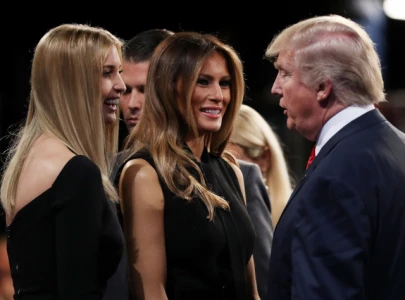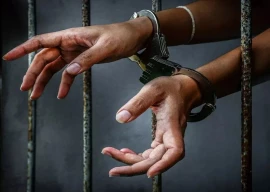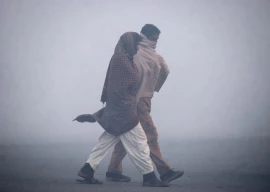
In a speech to the UN General Assembly, Sarkozy also called for "one year to reach a definitive agreement" between Israel and the Palestinians, saying the usual US-led peace process should not bypass European, Arab or other countries.
Aiming to avoid a showdown, Sarkozy sought a middle road between the Palestinian plan to ask the UN Security Council to admit Palestine as a full state and the US determination to block the effort with a veto, which he warned would be dangerous.
"Each of us knows that Palestine cannot immediately obtain full and complete recognition of the status of United Nations member state. The first reason for this is the lack of trust between the main parties," Sarkozy said.
"But who could doubt that a veto at the Security Council risks engendering a cycle of violence in the Middle East?" the French leader said.
"Must we therefore exclude an intermediate stage? Why not envisage offering Palestine the status of United Nations observer state? This would be an important step forward," Sarkozy said.
"Most important, it would mean emerging from a state of immobility that favors only the extremists. We would be restoring hope by marking progress towards the final status."
Under UN rules, any bid for full membership requires a recommendation from the Security Council and then a two-thirds majority in the 193-member General Assembly.
Non-member status would require only a straight majority in the General Assembly where no veto is possible.
It would also give the Palestinians access to international organizations like the World Health Organization and perhaps the International Criminal Court.
The French leader later met with US President Barack Obama who has insisted that only negotiations between Israel and the Palestinians can forge a lasting peace.
Obama did not comment on the French leader's proposals, but Ben Rhodes, a deputy national security advisor, said Sarkozy's suggestions were "important" and "constructive."
But he added there were differences over the role of the United Nations in the process. "President Sarkozy is a leader who speaks his mind, who speaks directly, who puts forward ideas," Rhodes said.
"It is indicative of his interest in trying to catalyze the process. There are issues of commonality that we can work with the French on around the need to get back to negotiations.
"There are a lot of areas where we think we can work with the French even as we have had a different view on the UN."
Sarkozy had also called for greater involvement of the international community in the peace process, suggesting the process led by the United States, Israel's top ally, was leading nowhere.
He appeared to imply that the role of the Diplomatic Quartet on the Middle East -- composed of the United States, the European Union, Russia and the United Nations -- was not enough to find a peaceful settlement.
"Let us stop believing that a single country or a small group of countries can resolve so complex a problem. Too many crucial players have been sidelined for our efforts to succeed," he said.
"After so many failures, who still believes that the peace process can succeed" without Europe, without all the Security Council's permanent members, and without the Arab states that "have chosen peace?" Sarkozy asked.
The French leader also called for a timeline for negotiations, which stalled weeks after they were relaunched by President Barack Obama's administration in September last year.
"One month to resume discussions; six months to find an agreement on borders and security; and one year to reach a definitive agreement," he said.
Like Obama, he said negotiations should lead to two states, including a Palestinian nation based on the boundaries that existed before the 1967 war but with agreed land swaps to account for some Jewish settlements.
But his proposals met with a lukewarm reaction from German Foreign Minister Guido Westerwelle who said they were "not a surprise for us" as they contained elements which had already been discussed in the international community.
COMMENTS (3)
Comments are moderated and generally will be posted if they are on-topic and not abusive.
For more information, please see our Comments FAQ

1726117332-0/Megan-Thee-Stallion-(1)1726117332-0-165x106.webp)



1732012115-0/Untitled-design-(14)1732012115-0-270x192.webp)

















America was founded as a republic. Our founders warned not to let it become an evil democracy. Guess what happened? They conviced everyone to elect officials to "have the power" instead of the people. We're too busy to say how the country should operate, let's choose Representatives and Senators who will decide these things for us! And let's just assume they'll do all they promise!
How are they chosen? They've all been bred, nurtured, raised, educated, and pushed into the roles by the same corporations and families that have been running things since before America even existed. Those businesses, corporations, power hungry wealthy, OTHER COUNTRIES LIKE ISRAEL AND SAUDI ARABIA, etc, give them all the financial backing they need. Why do people fund and lobby? To leverage control of the elected puppets to vote certain ways that benefit themselves and to keep control of their positions, as opposed to a "of/by/for the people" perspective. It's so simple, really. I wish I didn't live in a country surrounded by bipedal sheep.
There's way too many dots to connect here. Blue vs Red, Dem vs Rep, it doesn't really matter either way. Candidates from both sides are groomed by the same peoples. They each might take a different route, but the goal remains the same... total domination and leadership control of a united world economic and political system.
Remember every time you hear "democracy" it is another evil trick to make people think they have any real control - that's what America wants to spread to the rest of the world - DEMOCRACY! We're real people, living real lives, in the REAL WORLD. LET THE PEOPLE HAVE THE POWER.
Clever way of declining membership !!!